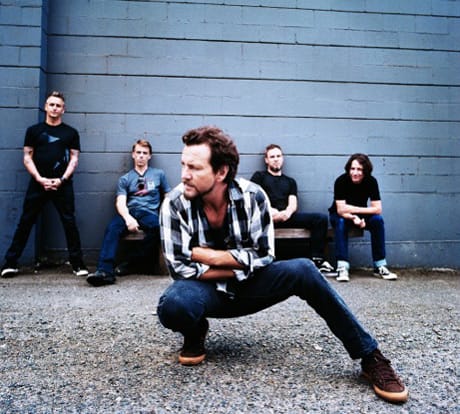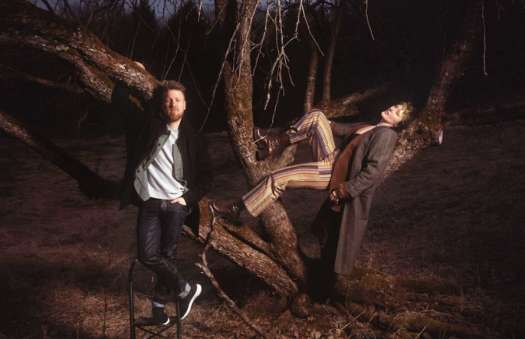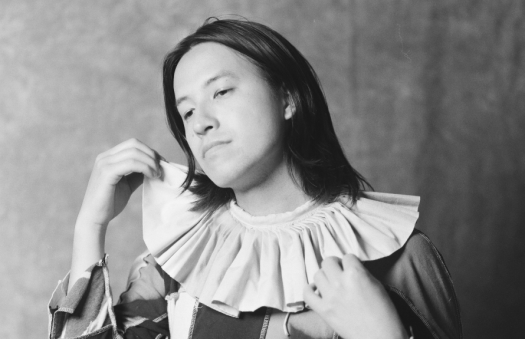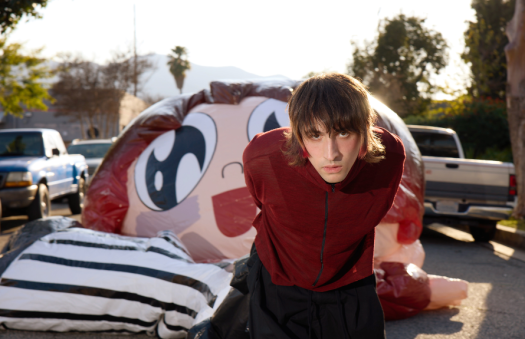For all of the attention paid to vocalist Eddie Vedder as the most prominent member of Pearl Jam, the Seattle institution's ongoing success can largely be credited to the band members' loyalty to one another, still best represented by the photo on the cover of their debut album, Ten. The 20th anniversary of that release was marked in 2011, and Pearl Jam's new album Lightning Bolt begins a new chapter on solid footing with a return to their trademark blend of pure punk fury and introspective balladry. Lead guitarist Mike McCready spoke about the two-year process behind making the album, how the band sees itself entering its third decade, and why he was compelled to revisit a teenage obsession with Eddie Van Halen.
I want to first ask about the couple of gigs you did in the summer where you previewed some of the new album. One was in London, Ontario, but the show at Chicago's Wrigley Field was a lot more epic by all accounts.
Yeah, Chicago was something that may not have happened. We were seven songs into the set and we had to stop because lightning storms were coming on with 60 mile-an-hour winds. Eddie had to get most of the stadium to evacuate, and we were just like, "Oh no." I was expecting the worst because you never know with Mother Nature, and because of our past experiences like that. So it was a really tense, tense time. Luckily we worked things out with the city and the fans really came through, hanging out towards the end. I was shocked. We went back on at midnight and people were still there. We were very blessed that we even got to do the show at all. I was very excited and relieved that we could go on stage at midnight, which is a late hour for a bunch of old rockers like ourselves. And for the fans — we were worried about that too, but we really wanted to make it happen, and luckily all the stars aligned and we could.
You guys are gearing up now for a full-scale tour. What goes into preparing for that, musically and mentally?
Musically, we have to be ready with almost every one of our songs, and we have about 200-plus. We just start listening to them again and going over them. Some are ingrained, and some aren't. We have to be ready to play songs that we haven't played for a while, and be ready to change the set every single night, which is what we always do. It's all about getting into that mindset of not being comfortable, which is fine. Playing rock shows for me is still super fun. It's kind of stressful at times, but it's more like a great release. I feel like mentally it's like going on a working vacation, if that makes sense. I get to play music, and people still come out, so we're very lucky in that sense.
The band's 20th anniversary was marked extensively in 2011 with the Cameron Crowe documentary and the shows surrounding it. Once all of that was finished, was there a shared eagerness to start a new chapter?
Yeah, I guess. I'm not sure I'd call it a new chapter. I kind of look at it as anniversary put everything in a linear sense for me. Like, this is what we've done over the past 20 years and now I can see it, whereas before, it was all over the place and not mapped out at all. When Cameron put the documentary together and edited it the way he did, I remembered all the stuff that happened after seeing it, all the highs and the lows, and it made me, in a musical sense, kind of more complete. It was like, "Okay, I did do all of this stuff, and this is what the band has gone through," and it's all in this movie. But you're right, it is another chapter, and maybe we're starting a new movie now. I'm just amazed that we're still around, and people in London, Ontario will come out to see us as we're working out the kinks of our new sound and lighting system. Getting back to your other question about preparations, that's basically what we wanted to do in London, and we were really happy with how that worked out. The new lighting system isn't anything too crazy, but we wanted to do something that kept things interesting for both us and the fans.
To follow up on that, what keeps driving you guys, and where do you see Pearl Jam right now within the wider musical world?
I wonder where we are. I think we're in our own thing, which is we're lucky to still sell out some stadiums here and there, thanks to a fan base that's pretty strong. We don't sell as many records as we used to, but what motivates us is that we still want to keep creating. As an artist, or as a guitar player, I still want to keep getting better. I think when we get together we create something different than any other situation I'm involved in. It's fun and exhausting and frustrating and exciting — it's all of these things that happen, but I'm glad it happens because it's something that makes my life complete in an artistic sense.
There are other things I certainly like doing, but getting to play with the guys and creating new music and going on the road, it's all still fun. I think we all enjoy hanging out with each other a little bit. I'm sure we get tired of each other sometimes, but, I don't know, I really enjoy playing with the guys and I think everybody does with each other. I think we create music that's indicative of that. It's not always easy; this record took two years on and off to figure out and it wasn't really a piece of cake to record it. It took a long time. We did seven songs two years ago, than we stopped, waited for a long time, re-wrote a bunch of stuff or wrote new stuff and brought those seven to 15 ideas in. The actual recording time wasn't long, but it happened during several two-week spans over two years, so it took a long time. I feel kind of relieved that we got it done.
Would you say there's more of a sense of accomplishment with this record than previous ones, having struggled with it for so long?
Yeah. I feel Brendan [O'Brien] put us through the grinder and really made us try things in different ways whenever we got together. I feel we accomplished a lot going through that process. It wasn't always enjoyable, but that's okay. Out of that came some cool art. It's silly for me to even complain about it, but I guess what I'm saying is we had to work hard to get to it, and I get a great sense of pride out of that.
I heard "Mind Your Manners" for the first time on the radio and for a second I thought it was a new Motörhead track. How did that song come about?
When I was writing the music for that, I was thinking I wanted something with a Dead Kennedys kind of feel — a manic energy that makes you uncomfortable but kind of excited, hopefully. The Dead Kennedys had that kind of energy, which I don't feel any other bands had, and I wanted to try to capture a bit of that. Ed seemed to respond to it, and came up with "mind your manners," which I thought was a catchy thing, and Jeff helped me arrange the stops, which weren't part of the song originally. So, yeah, I wrote the music, but it was really a collaborative effort, like most of our stuff is. It helps when we all get our hooks into something, it always makes a song better. And [drummer] Matt [Cameron]'s like a freight train. I'm still figuring out how to keep up with him live.
Having him in the band must be such a pleasure. How has his presence changed the dynamic of the band as far as writing goes?
I think he's made us a stronger band. I felt a confidence in our band prior to having him there, but Matt kind of sealed that confidence. He's just a solid rock of energy; plays jazzy, but also has a groove. He plays these complex time things that he makes look easy. It's allowed me to be free and just do my leads and get way into it. When you're writing songs with him, it's the same way. You know that he's going to have ideas, and figure things out immediately. It's just a great confidence booster to have him around.
Talking about Matt's versatility, the new album shows off a lot of that within the band overall, from starting out really aggressively to the really cool quieter stuff at the end. Is it important to always have that kind of flow on your records?
It is important even though that's not how people generally listen to music these days. We all grew up with playing records from start to finish and hearing the whole story. So, when we're working on a new album, we'll listen to all the songs in a certain order, and then in a different order, and then back to another order — everybody's emailing each other constantly with ideas. We'll have little meetings about, well this flows into here, but this one's in the same key so it should be next to this one. The consensus on this one was "Future Days" was the perfect way to end a record. It was slow, so that meant starting off the record more rocking and then bringing it down. You want to take a listener — at least we do — on a journey. That's how I like to listen to records. The new Black Rebel Motorcycle Club album, Specter At the Feast, is impeccable, and I have to listen to it all the way through. Those guys are my new heroes. So, if people can feel like they've gone on some kind of journey with our new record, then it's served its purpose.
I detected a tip of the hat to Neil Young's "Helpless" on the song "Yellow Moon" as well.
Sure. There's certainly a tip of the hat to Neil. We always have fun in Canada, and I've made an effort to visit a lot of the cool areas with my family when we've been on tour there. Hopefully we'll get to do it again. I'd love to be able to play from St. John's to Yellowknife, there's so many cool places. In terms of "Yellow Moon," that was a song that was initially taken off of the first mixes, but I really, really wanted it on there. I just enjoyed the darkness of it, and I thought I did a pretty good lead on it. I worked hard on that; it's kind of a simple lead but I wanted it to give the song some brightness, kind of like what David Gilmour always did with Pink Floyd.
It's interesting you say that. It reminds me of when I heard you say once that your solo on "Alive" was a tribute to Robby Krieger's solo on the Doors' "Five To One." How do you describe how your guitar playing has evolved over the years?
I know my style now, and hopefully it's ever-evolving. The latest thing I've wanted to do is figure out how to play Eddie Van Halen's "Eruption." It seemed super-important to do that, since the first time I heard it was when I was 11 years old and first starting playing guitar. It was the most incredible thing I'd ever heard in my life, and I had no idea what he was doing. So I felt like now I could do it, given that I'm a lot better guitar player than what I was when I was 11. I actually think that trying to learn it has helped me expand my guitar playing a little bit in terms of going in different ways than before I learned "Eruption." I'm not doing a whole bunch of finger-tapping or anything, it's just kind of expanded my palette of where to go. I wasn't expecting that to happen; I was hoping just to figure it out and say, okay that's rad. But out of that came a lot of new stuff. I think over the years I've been able to emulate a lot of my heroes in playing really fast, metal stuff or country-type stuff, and out of that I created my own style. But it certainly was a conscious effort to try to play like certain guys. I was thinking about it in those kind of terms, and now the songs dictate how I'm going to play. "Sirens" is another example of going in a David Gilmour kind of direction, where like "Yellow Moon," there was no way I was going to put down a fast, crazy lead. Hopefully my style adds to what the song dictates.
I hate to make you speak for Ed, but do you think there were any specific themes he was trying to get across on this album?
I hesitate to answer that because I want the listener to figure out what that is. He wouldn't tell me what he was writing about, but I can say he was very serious about this record and very much wanted it to happen over the past two years. There were times of frustration and times of excitement, just like I was talking about earlier. There could be some perspective of being an older guy now and having kids and looking back over the years. But I just say, listen to it and come up with your own interpretation.
Lastly, as a fan of Mad Season, the deluxe reissue of the album last year seemed to bring that project full circle. Are there any other side projects you've been working on?
I'm always interested in doing something. Duff McKagen, Barrett Martin and I recorded some songs together after we did the Mad Season reissue, and we've had a couple singers put some ideas over them, one being Jaz Coleman from Killing Joke and another being Jeff Angell from the Walking Papers. I'm talking to a few other singers as well. We're trying to do another thing that's sort of been spawned from the Mad Season thing, although it probably won't be called that. You'll hear some music from that hopefully next year.
I want to first ask about the couple of gigs you did in the summer where you previewed some of the new album. One was in London, Ontario, but the show at Chicago's Wrigley Field was a lot more epic by all accounts.
Yeah, Chicago was something that may not have happened. We were seven songs into the set and we had to stop because lightning storms were coming on with 60 mile-an-hour winds. Eddie had to get most of the stadium to evacuate, and we were just like, "Oh no." I was expecting the worst because you never know with Mother Nature, and because of our past experiences like that. So it was a really tense, tense time. Luckily we worked things out with the city and the fans really came through, hanging out towards the end. I was shocked. We went back on at midnight and people were still there. We were very blessed that we even got to do the show at all. I was very excited and relieved that we could go on stage at midnight, which is a late hour for a bunch of old rockers like ourselves. And for the fans — we were worried about that too, but we really wanted to make it happen, and luckily all the stars aligned and we could.
You guys are gearing up now for a full-scale tour. What goes into preparing for that, musically and mentally?
Musically, we have to be ready with almost every one of our songs, and we have about 200-plus. We just start listening to them again and going over them. Some are ingrained, and some aren't. We have to be ready to play songs that we haven't played for a while, and be ready to change the set every single night, which is what we always do. It's all about getting into that mindset of not being comfortable, which is fine. Playing rock shows for me is still super fun. It's kind of stressful at times, but it's more like a great release. I feel like mentally it's like going on a working vacation, if that makes sense. I get to play music, and people still come out, so we're very lucky in that sense.
The band's 20th anniversary was marked extensively in 2011 with the Cameron Crowe documentary and the shows surrounding it. Once all of that was finished, was there a shared eagerness to start a new chapter?
Yeah, I guess. I'm not sure I'd call it a new chapter. I kind of look at it as anniversary put everything in a linear sense for me. Like, this is what we've done over the past 20 years and now I can see it, whereas before, it was all over the place and not mapped out at all. When Cameron put the documentary together and edited it the way he did, I remembered all the stuff that happened after seeing it, all the highs and the lows, and it made me, in a musical sense, kind of more complete. It was like, "Okay, I did do all of this stuff, and this is what the band has gone through," and it's all in this movie. But you're right, it is another chapter, and maybe we're starting a new movie now. I'm just amazed that we're still around, and people in London, Ontario will come out to see us as we're working out the kinks of our new sound and lighting system. Getting back to your other question about preparations, that's basically what we wanted to do in London, and we were really happy with how that worked out. The new lighting system isn't anything too crazy, but we wanted to do something that kept things interesting for both us and the fans.
To follow up on that, what keeps driving you guys, and where do you see Pearl Jam right now within the wider musical world?
I wonder where we are. I think we're in our own thing, which is we're lucky to still sell out some stadiums here and there, thanks to a fan base that's pretty strong. We don't sell as many records as we used to, but what motivates us is that we still want to keep creating. As an artist, or as a guitar player, I still want to keep getting better. I think when we get together we create something different than any other situation I'm involved in. It's fun and exhausting and frustrating and exciting — it's all of these things that happen, but I'm glad it happens because it's something that makes my life complete in an artistic sense.
There are other things I certainly like doing, but getting to play with the guys and creating new music and going on the road, it's all still fun. I think we all enjoy hanging out with each other a little bit. I'm sure we get tired of each other sometimes, but, I don't know, I really enjoy playing with the guys and I think everybody does with each other. I think we create music that's indicative of that. It's not always easy; this record took two years on and off to figure out and it wasn't really a piece of cake to record it. It took a long time. We did seven songs two years ago, than we stopped, waited for a long time, re-wrote a bunch of stuff or wrote new stuff and brought those seven to 15 ideas in. The actual recording time wasn't long, but it happened during several two-week spans over two years, so it took a long time. I feel kind of relieved that we got it done.
Would you say there's more of a sense of accomplishment with this record than previous ones, having struggled with it for so long?
Yeah. I feel Brendan [O'Brien] put us through the grinder and really made us try things in different ways whenever we got together. I feel we accomplished a lot going through that process. It wasn't always enjoyable, but that's okay. Out of that came some cool art. It's silly for me to even complain about it, but I guess what I'm saying is we had to work hard to get to it, and I get a great sense of pride out of that.
I heard "Mind Your Manners" for the first time on the radio and for a second I thought it was a new Motörhead track. How did that song come about?
When I was writing the music for that, I was thinking I wanted something with a Dead Kennedys kind of feel — a manic energy that makes you uncomfortable but kind of excited, hopefully. The Dead Kennedys had that kind of energy, which I don't feel any other bands had, and I wanted to try to capture a bit of that. Ed seemed to respond to it, and came up with "mind your manners," which I thought was a catchy thing, and Jeff helped me arrange the stops, which weren't part of the song originally. So, yeah, I wrote the music, but it was really a collaborative effort, like most of our stuff is. It helps when we all get our hooks into something, it always makes a song better. And [drummer] Matt [Cameron]'s like a freight train. I'm still figuring out how to keep up with him live.
Having him in the band must be such a pleasure. How has his presence changed the dynamic of the band as far as writing goes?
I think he's made us a stronger band. I felt a confidence in our band prior to having him there, but Matt kind of sealed that confidence. He's just a solid rock of energy; plays jazzy, but also has a groove. He plays these complex time things that he makes look easy. It's allowed me to be free and just do my leads and get way into it. When you're writing songs with him, it's the same way. You know that he's going to have ideas, and figure things out immediately. It's just a great confidence booster to have him around.
Talking about Matt's versatility, the new album shows off a lot of that within the band overall, from starting out really aggressively to the really cool quieter stuff at the end. Is it important to always have that kind of flow on your records?
It is important even though that's not how people generally listen to music these days. We all grew up with playing records from start to finish and hearing the whole story. So, when we're working on a new album, we'll listen to all the songs in a certain order, and then in a different order, and then back to another order — everybody's emailing each other constantly with ideas. We'll have little meetings about, well this flows into here, but this one's in the same key so it should be next to this one. The consensus on this one was "Future Days" was the perfect way to end a record. It was slow, so that meant starting off the record more rocking and then bringing it down. You want to take a listener — at least we do — on a journey. That's how I like to listen to records. The new Black Rebel Motorcycle Club album, Specter At the Feast, is impeccable, and I have to listen to it all the way through. Those guys are my new heroes. So, if people can feel like they've gone on some kind of journey with our new record, then it's served its purpose.
I detected a tip of the hat to Neil Young's "Helpless" on the song "Yellow Moon" as well.
Sure. There's certainly a tip of the hat to Neil. We always have fun in Canada, and I've made an effort to visit a lot of the cool areas with my family when we've been on tour there. Hopefully we'll get to do it again. I'd love to be able to play from St. John's to Yellowknife, there's so many cool places. In terms of "Yellow Moon," that was a song that was initially taken off of the first mixes, but I really, really wanted it on there. I just enjoyed the darkness of it, and I thought I did a pretty good lead on it. I worked hard on that; it's kind of a simple lead but I wanted it to give the song some brightness, kind of like what David Gilmour always did with Pink Floyd.
It's interesting you say that. It reminds me of when I heard you say once that your solo on "Alive" was a tribute to Robby Krieger's solo on the Doors' "Five To One." How do you describe how your guitar playing has evolved over the years?
I know my style now, and hopefully it's ever-evolving. The latest thing I've wanted to do is figure out how to play Eddie Van Halen's "Eruption." It seemed super-important to do that, since the first time I heard it was when I was 11 years old and first starting playing guitar. It was the most incredible thing I'd ever heard in my life, and I had no idea what he was doing. So I felt like now I could do it, given that I'm a lot better guitar player than what I was when I was 11. I actually think that trying to learn it has helped me expand my guitar playing a little bit in terms of going in different ways than before I learned "Eruption." I'm not doing a whole bunch of finger-tapping or anything, it's just kind of expanded my palette of where to go. I wasn't expecting that to happen; I was hoping just to figure it out and say, okay that's rad. But out of that came a lot of new stuff. I think over the years I've been able to emulate a lot of my heroes in playing really fast, metal stuff or country-type stuff, and out of that I created my own style. But it certainly was a conscious effort to try to play like certain guys. I was thinking about it in those kind of terms, and now the songs dictate how I'm going to play. "Sirens" is another example of going in a David Gilmour kind of direction, where like "Yellow Moon," there was no way I was going to put down a fast, crazy lead. Hopefully my style adds to what the song dictates.
I hate to make you speak for Ed, but do you think there were any specific themes he was trying to get across on this album?
I hesitate to answer that because I want the listener to figure out what that is. He wouldn't tell me what he was writing about, but I can say he was very serious about this record and very much wanted it to happen over the past two years. There were times of frustration and times of excitement, just like I was talking about earlier. There could be some perspective of being an older guy now and having kids and looking back over the years. But I just say, listen to it and come up with your own interpretation.
Lastly, as a fan of Mad Season, the deluxe reissue of the album last year seemed to bring that project full circle. Are there any other side projects you've been working on?
I'm always interested in doing something. Duff McKagen, Barrett Martin and I recorded some songs together after we did the Mad Season reissue, and we've had a couple singers put some ideas over them, one being Jaz Coleman from Killing Joke and another being Jeff Angell from the Walking Papers. I'm talking to a few other singers as well. We're trying to do another thing that's sort of been spawned from the Mad Season thing, although it probably won't be called that. You'll hear some music from that hopefully next year.




